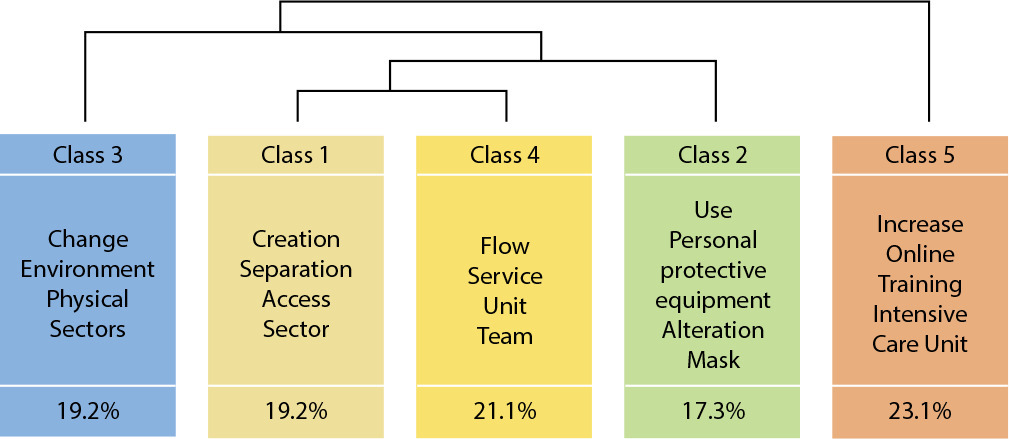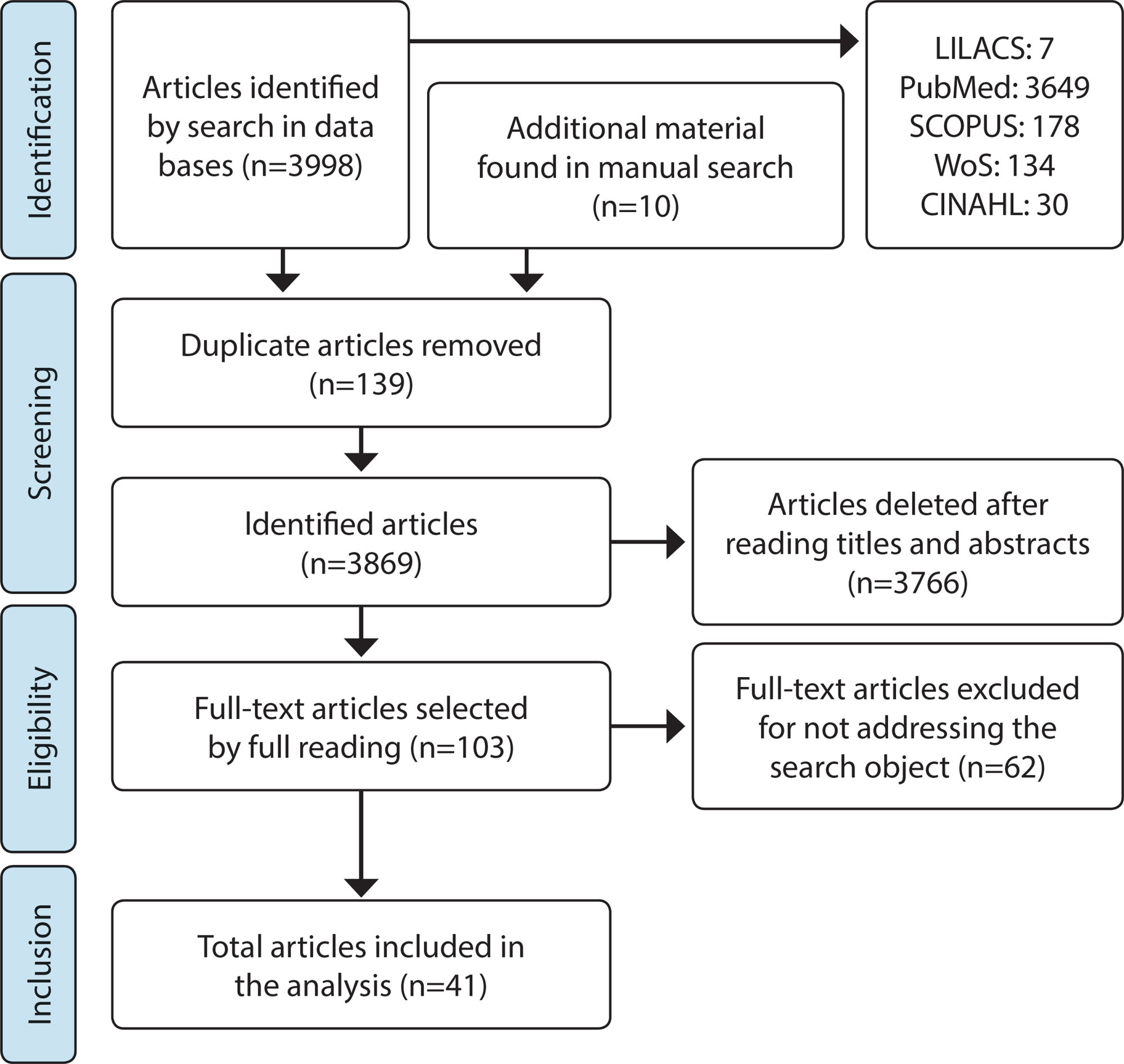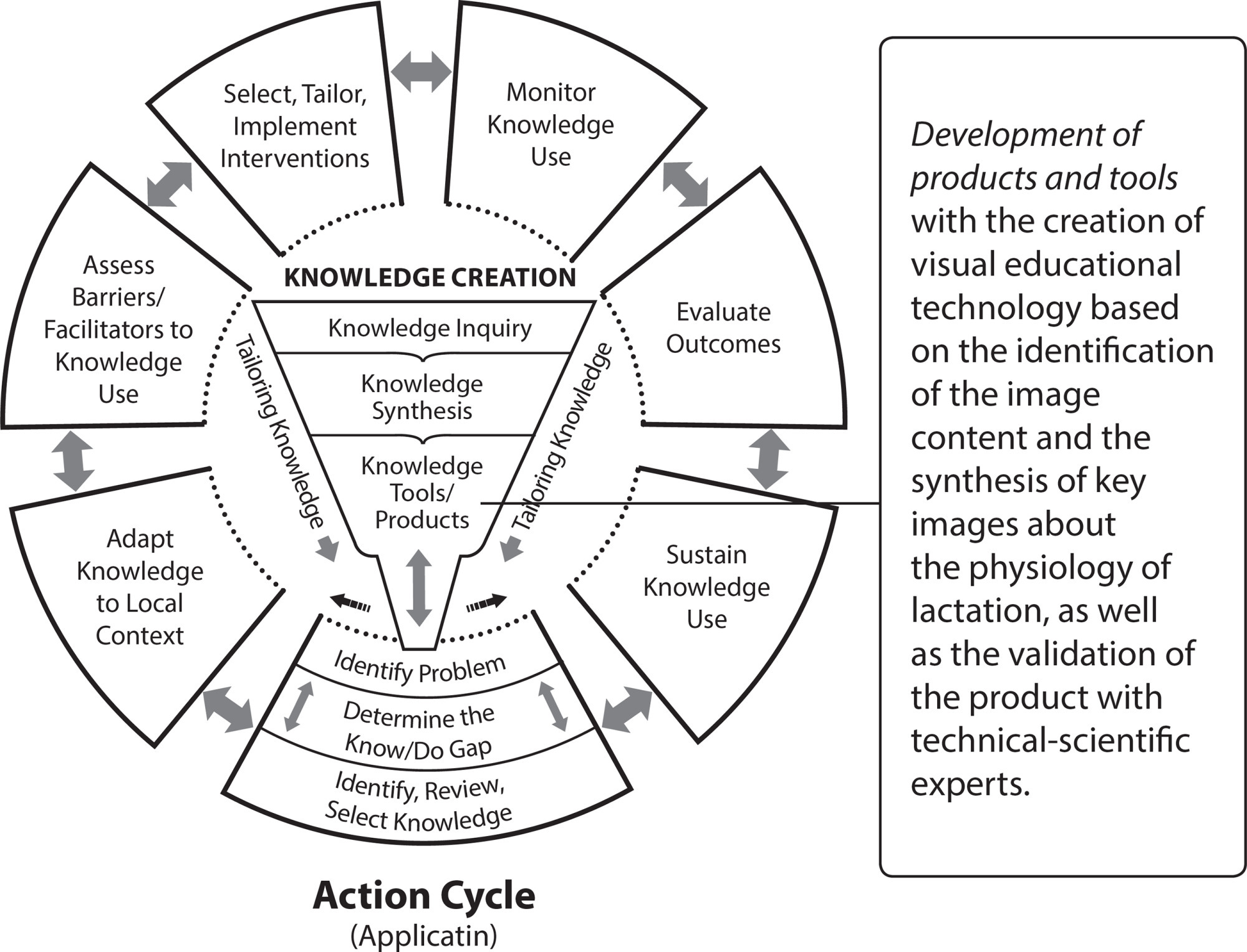-
LETTER TO THE EDITOR
Dimensioning the instrumentation: Exploratory or confirmatory factor analysis?
Revista Brasileira de Enfermagem. 2017;70(2):233-234
01-01-2017
Abstract
LETTER TO THE EDITORDimensioning the instrumentation: Exploratory or confirmatory factor analysis?
Revista Brasileira de Enfermagem. 2017;70(2):233-234
01-01-2017 -
EDITORIAL
Viral hepatitis: a challenge for nursing
Revista Brasileira de Enfermagem. 2017;70(2):231-232
01-01-2017
Abstract
EDITORIALViral hepatitis: a challenge for nursing
Revista Brasileira de Enfermagem. 2017;70(2):231-232
01-01-2017DOI 10.1590/0034-7167.2017700201
Views0The 20th century unveiled the mystery of the etiology of viral hepatitis, with the identification of five different agents responsible for these infections: the hepatitis A virus (HAV), hepatitis B virus (HBV), hepatitis C virus (HCV), hepatitis D virus (HDV), and hepatitis E virus (HEV). These viruses account for one million deaths every year. HBV, […]See more -
EDITORIAL
Hepatites Virais: um desafio para enfermagem
Revista Brasileira de Enfermagem. 2017;70(2):231-232
01-01-2017
Abstract
EDITORIALHepatites Virais: um desafio para enfermagem
Revista Brasileira de Enfermagem. 2017;70(2):231-232
01-01-2017DOI 10.1590/0034-7167.2017700201
Views0O século XX desvendou os mistérios sobre a etiologia das hepatites virais, identificando cinco agentes distintos responsáveis por essas viroses: vírus da hepatite A (HAV), vírus da hepatite B (HBV), vírus da hepatite C (HCV), vírus da hepatite D (HDV) e vírus da hepatite E (HEV). Esses vírus são responsáveis por um milhão de mortes […]See more -
ERRATUM
ERRATUM
Revista Brasileira de Enfermagem. 2017;70(1):242-242
01-01-2017
Abstract
ERRATUMERRATUM
Revista Brasileira de Enfermagem. 2017;70(1):242-242
01-01-2017DOI 10.1590/0034-7167.20177001e01
Views0Article “Accessibility assessment of assistive technology for the hearing impaired”, with number of DOI: , published in the journal Revista Brasileira de Enfermagem, v69(5):781-7, page 781 that read:“Luciana Vieira de CaravalhoI”.[…]See more -
REVIEW
From silence to voice: book review
Revista Brasileira de Enfermagem. 2017;70(1):240-241
01-01-2017
Abstract
REVIEWFrom silence to voice: book review
Revista Brasileira de Enfermagem. 2017;70(1):240-241
01-01-2017DOI 10.1590/0034-7167-2016-0066
Views1The book() is a translation of the original titled From silence to voice(), published by Cornell Paperbacks in 2006. Bernice Burech and Susanne Gordon are journalists and took the nursing profession as the object of study. The authors have diagnosed silence in the profession, which motivated writing a work valuing the use of all types […]See more -
REFLECTION
Reflections in the light of the complexity theory and nursing education
Revista Brasileira de Enfermagem. 2017;70(1):236-239
01-01-2017
Abstract
REFLECTIONReflections in the light of the complexity theory and nursing education
Revista Brasileira de Enfermagem. 2017;70(1):236-239
01-01-2017DOI 10.1590/0034-7167-2016-0239
Views0See moreABSTRACT
Objective:
to reflect on nursing education, taking into account the principles of complex thinking proposed by Morin.
Method:
reflection based on the principles of the complexity theory by Edgar Morin.
Results:
the application of complexity in teaching proposes an emancipatory education based on questioning and social transformation. It comprises the education of nurses who interact with others as a characteristic of their work. It is necessary to prepare students to develop critical and reflective attitudes and actions to overcome the fragmentation and linearity of knowledge.
Conclusion:
nursing care has been based on a reductionist assistance, reflecting the Cartesian model. Thus, nursing education seeks to comprise shared knowledge and experiences so that no subject or professional overpowers another, accepting the uniqueness of professionals and patients.
-
EXPERIENCE REPORT
Pelvic floor rehabilitation program: report of 10 years of experience
Revista Brasileira de Enfermagem. 2017;70(1):231-235
01-01-2017
Abstract
EXPERIENCE REPORTPelvic floor rehabilitation program: report of 10 years of experience
Revista Brasileira de Enfermagem. 2017;70(1):231-235
01-01-2017DOI 10.1590/0034-7167-2016-0257
Views0ABSTRACT
Objective:
to relate the creation, experience of establishment and service performed in the Pelvic Floor Rehabilitation Program [(PRAP)], a project of the School of Nursing of University of Campinas (UNICAMP), developed at a health unity in Campinas, São Paulo, Brazil.
Results:
this Program appeared due to the high demand of patients with urinary incontinence (UI) and need of formation or qualification of professionals to serve those customers and multiply the actions at other health unities. Nowadays, the PRAP is in its tenth year, and it has served 102 patients with UI and other dysfunctions of the pelvic floor and lower urinary tract, qualified 480 health professionals and stimulated researches.
Conclusion:
the preventive actions of pelvic floor rehabilitation are important areas of the nurse’s performance and initiatives as the related ones contribute for the professional formation and practice based on evidences.
Keywords:Lower Urinary Tract SymptomsNursingPelvic Floor DisordersRehabilitation ServicesUrinary IncontinenceSee more
-
ORIGINAL ARTICLE
Changes implemented in the work environment of nurses in the COVID-19 pandemic
Revista Brasileira de Enfermagem. 2022;75:e20201381
11-29-2022
Abstract
ORIGINAL ARTICLEChanges implemented in the work environment of nurses in the COVID-19 pandemic
Revista Brasileira de Enfermagem. 2022;75:e20201381
11-29-2022DOI 10.1590/0034-7167-2020-1381
Views0See moreABSTRACT
Objective:
to describe the changes implemented in the work environment of nurses in university hospitals considering the COVID-19 pandemic.
Methods:
this qualitative and descriptive research was developed from an online survey with 75 nurses from three Brazilian university hospitals. Data processing occurred through textual analysis with the aid of software IRAMUTEQ.
Results:
five semantic classes were obtained: Organization of units for exclusive care of patients with COVID-19; Adaptations in the use of personal protective equipment; Physical structure adaptation; Care flow institution; Increased number of beds and training courses. Final considerations: the results show the effort of healthcare and nursing professionals/managers in the development of structural adaptations and reorganizations of care processes, in the hospital context, to respond with quality and efficiency to the demands arising from the COVID-19 pandemic.

-
ORIGINAL ARTICLE
Permanent education for good practices in the prevention of pressure injury: almost-experiment
Revista Brasileira de Enfermagem. 2019;72(6):1646-1652
10-21-2019
Abstract
ORIGINAL ARTICLEPermanent education for good practices in the prevention of pressure injury: almost-experiment
Revista Brasileira de Enfermagem. 2019;72(6):1646-1652
10-21-2019DOI 10.1590/0034-7167-2018-0778
Views0See moreABSTRACT
Objective:
To verify the effectiveness of the educational intervention through the evaluation of nurses’ knowledge about prevention of pressure injury.
Method:
A quasi-experimental study with a single group, carried out with 95 nurses from a teaching hospital in the interior of Minas Gerais, in August and September 2017. As a teaching strategy, the active methodology and hybrid teaching were used, based on the reference of the Method of the Arch of Charles Maguerez. Data were collected from a validated instrument, called the Pieper Knowledge Test, and analyzed by descriptive statistics and Student’s t-test with significance level of p <0.001.
Results:
The mean number of correct answers obtained by the nurses was 78.8% in the pre-test and 88.8% in the post-test, and the difference was statistically significant (p <0.001).
Conclusion:
The educational intervention developed was effective, since it contributed to the improvement of nurses’ knowledge.

-
ORIGINAL ARTICLE
Nurse care for the hospitalized elderly’s spiritual dimension
Revista Brasileira de Enfermagem. 2019;72:236-242
12-05-2019
Abstract
ORIGINAL ARTICLENurse care for the hospitalized elderly’s spiritual dimension
Revista Brasileira de Enfermagem. 2019;72:236-242
12-05-2019DOI 10.1590/0034-7167-2018-0685
Views0See moreABSTRACT
Objective:
to analyze the nurse care for the spiritual hospitalized elderly’s dimension.
Method:
a qualitative study, based on Jean Watson’s Theory of Human Caring. The study included 17 nurses working in a geriatric center in Salvador City, Bahia State, Brazil. The collection of testimonies occurred between January and April of 2018, through an interview.
Results:
spiritual care were dialogue, encouragement and respect for religious activities, embracement, empathy. One of the obstacles to providing this care was the lack of preparation in accessing the elderly’s spiritual dimension.
Final considerations:
spirituality is a dimension of human and holistic nursing care. Caring for the spirit contributes to foster transpersonal care. The difficulty may be in the lack of nurses’ preparation. It is necessary that they cultivate and live their own spirituality, transmitting the understanding in each care relationship.
-
EXPERIENCE REPORT
Use of webQDA software on qualitative nursing research: an experience report
Revista Brasileira de Enfermagem. 2020;73(3):e20180411
04-03-2020
Abstract
EXPERIENCE REPORTUse of webQDA software on qualitative nursing research: an experience report
Revista Brasileira de Enfermagem. 2020;73(3):e20180411
04-03-2020DOI 10.1590/0034-7167-2018-0411
Views0See moreABSTRACT
Objectives:
to report the user experience of the webQDA software in the support of qualitative data analysis about health literacy of older adults.
Methods:
quasi-experimental research developed from January 2014 to January 2015, with 118 older adults, all of whom were interviewed to assess the level of health literacy. Interviews were carried out before and after four educational interventions, according to Freire’s method named Culture Circle. The interviews were transcribed and entered in the software, which highlighted the analytical categories.
Results:
the systems of sources, interpretative encoding and questioning of the data available in the software allowed the construction of three categories for the literacy levels and four categories for their dimensions.
Final considerations:
We concluded that the webQDA software enables the structured encoding of qualitative materials, ensuring faster and effective management of data with systematization and analytical transparency.

-
Concept analysis of Perioperative Thirst for the development of a new nursing diagnosis
Revista Brasileira de Enfermagem. 2021;74(1):e20200065
03-03-2021
Abstract
Concept analysis of Perioperative Thirst for the development of a new nursing diagnosis
Revista Brasileira de Enfermagem. 2021;74(1):e20200065
03-03-2021DOI 10.1590/0034-7167-2020-0065
Views0See moreABSTRACT
Objectives:
to analyze the perioperative thirst concept for the development of a new diagnostic structure according to NANDA International.
Methods:
a concept analysis study based on the framework proposed by Walker and Avant, instrumentalized through an integrative literature review based on SCOPUS, CINAHL, PUBMED, LILACS, and WOS. The elaboration of the diagnostic structure followed NANDA International guidelines.
Results:
41 studies were analyzed revealing that perioperative thirst is prevalent and intense, having visceral and behavioral attributes as the core of the concept. Antecedents indicate that surgical patients are vulnerable to thirst; and consequents 16 signs and symptoms were organized and model cases were developed. A diagnostic structure has been developed for perioperative thirst.
Final Considerations:
concept analysis allowed language standardization that describes thirsty patients, helping the identification, planning of actions and communication of perioperative nursing care.

-
REFLECTION
Nursing Process in the Brazilian context: reflection on its concept and legislation
Revista Brasileira de Enfermagem. 2022;75(6):e20210898
05-11-2022
Abstract
REFLECTIONNursing Process in the Brazilian context: reflection on its concept and legislation
Revista Brasileira de Enfermagem. 2022;75(6):e20210898
05-11-2022DOI 10.1590/0034-7167-2021-0898
Views0ABSTRACT
Objectives:
to reflect on the global understanding of the Nursing Process concept, with emphasis on the Brazilian context.
Methods:
a reflection article, aligned with the vision and expertise of researchers who are members of the Nursing Process Research Network.
Results:
the reflection is presented in two main topics: The evolution of Systematization of Nursing Care X Nursing Process concepts and its consonance with national and international practices, and Brazilian legislation; The Nursing Process concept realignment in Brazilian legislation in line with current care, teaching and research practices. Final Considerations: the reflections were oriented to the Nursing Process’ conceptual, normative and legal issues, including elements of its historical evolution, and, with that, pointed to the need to modify the Brazilian regulation on the Nursing Process.
Keywords:Education, NursingLegislationNursingNursing CareNursing ProcessStandardized Nursing TerminologySee more -
ORIGINAL ARTICLE
Creation and validation of a visual educational technology content for lactation physiology learning
Revista Brasileira de Enfermagem. 2020;73(6):e20190564
09-07-2020
Abstract
ORIGINAL ARTICLECreation and validation of a visual educational technology content for lactation physiology learning
Revista Brasileira de Enfermagem. 2020;73(6):e20190564
09-07-2020DOI 10.1590/0034-7167-2019-0564
Views0ABSTRACT
Objective:
to create and validate a visual educational technology content for lactation physiology learning.
Method:
a methodological study that contemplated the stages of content creation and validation guided by the conceptual model of Knowledge Translation into action. The creation took place in partnership with the educational technology center of the project’s home institution. The validation was attended by 27 judges with experience in the obstetric, neonatal, pediatric or maternal and child areas and in the theme of breastfeeding.
Results:
an educational technology covered animation and video techniques to locate, respectively, elements of lactation physiology and the population involved. An Overall Content Validity Index of 0.84 was obtained.
Conclusion:
the visual educational technology for lactation physiology learning has been validated in content as a tool to introduce the theme and mediate health education actions that can have a positive impact on breastfeeding.
Keywords:Audiovisual ResourcesEducational TechnologyHealth EducationLactationTranslational Medical ResearchSee more
-
ORIGINAL ARTICLE
Risk of suicide among nursing students
Revista Brasileira de Enfermagem. 2021;74(6):e20200867
08-20-2021
Abstract
ORIGINAL ARTICLERisk of suicide among nursing students
Revista Brasileira de Enfermagem. 2021;74(6):e20200867
08-20-2021DOI 10.1590/0034-7167-2020-0867
Views0See moreABSTRACT
Objectives:
to identify the risk and degree of risk of suicide in nursing students of a public institution in the countryside of Pernambuco, Brazil.
Methods:
this was a cross-sectional, quantitative research conducted with 150 students. For data collection, a sociodemographic questionnaire and the instrument, M.I.N.I. – Brazilian version 5.0.0 – Module C – Risk of suicide were used. Statistical analyses were performed with IBM(® )SPSS(®), version 23.
Results:
53.3% of nursing students had a risk of suicide, of which 20.7% had a high risk. Moreover, 22.67% reported previous suicide attempt. It is noteworthy that students without a partner have a higher risk of suicide (56.8%) than those with a partner (29.4%).
Conclusions:
it is perceived the need to develop programs that identify students at risk of suicide in higher education institutions, in order to raise awareness of the problem and implement policies to promote mental health in the academia.
Search
Search in:
Nuvem de Tags
Aged (144) Atenção Primária à Saúde (239) COVID-19 (104) Cuidados de Enfermagem (269) Educação em Enfermagem (151) Educação em Saúde (139) Enfermagem (930) Estudos de Validação (131) Health Education (144) Idoso (208) Mental Health (149) Nursing (987) Nursing Care (306) Patient Safety (151) Primary Health Care (284) Qualidade de Vida (104) Quality of Life (106) Saúde Mental (145) Segurança do Paciente (150) Validation Studies (108)



